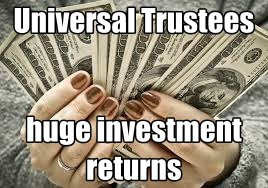Investment is time, energy,
or matter spent in the hope of future benefits actualized within a specified
date or time frame. Investment has different meanings in economics and finance.
In economics, investment is the accumulation of newly produced physical
entities, such as factories, machinery, houses, and goods inventories. In
finance, investment is putting money into an asset with the expectation of
capital appreciation for how to make money fast, dividends, and/or interest earnings. Say if you invest $ 5,000
in few months you will have the good returns.
This may or may not be
backed by research and analysis. Most or all forms of investment involve some
form of risk, such as investment in equities, property, and even fixed interest
securities which are subject, among other things, to inflation risk.These $ 5000 investments will give you high returns in the
future. It is indispensable for project investors to identify and manage the
risks related to the investment. An increase in income encourages higher best investments, whereas a higher
interest rate may discourage investment as it becomes more costly to borrow
money. Even if a firm chooses to use its own funds in an investment, the
interest rate represents an opportunity cost of investing those funds rather
than lending out that amount of money for interest. Specific views, plans or
ideas on ways to invest money effectively. Investment ideas typically involve
the expertise and advice of an investment advisor who recommends different
investment tools based on individual circumstances. One of the main factors
determining what investment idea a particular investor will employ depends on
that person's stage of life. Investors who are young can take on more risks,
and an ad visor will likely recommend stocks or mutual funds to younger
investors. Investors who are approaching retirement, however, will most likely
find it more beneficial to take on lower-risk, short-term investments such as bonds
and T-bills. Another factor that affects investment ideas is the risk-return
tradeoff. Capital appreciation may be more important for the young investor if
they knows how to invest money, but
once she enters her golden years, that same investor may place a greater
emphasis on gaining income. Whatever your objective, knowing what investment
options are out there is key.
A diversified portfolio not only reduces
unwanted risk, but also contributes to a winning portfolio. And having a
well-diversified portfolio doesn't necessarily mean just buying more than one
stock; branching out into other areas of investments
could be a viable alternative. By this way you can achieve the best return by
investing $ 5,000.

No comments:
Post a Comment